MKT203 Service Marketing: Airline Service Failure Analysis Report
VerifiedAdded on 2023/06/03
|10
|2295
|482
Report
AI Summary
This report examines a service failure incident within the airline industry, specifically focusing on the issue of lost or mishandled baggage. The analysis delves into the causes of this service failure, highlighting the impact on customer satisfaction and loyalty. The report then applies service quality and customer satisfaction theories, including the SERVQUAL model, to evaluate the incident and identify areas for improvement. A key component of the report is the development of a comprehensive service recovery strategy, encompassing proactive measures like implementing tracking devices and improving baggage handling systems, as well as reactive strategies such as providing apologies, assistance, and compensation. The report emphasizes the importance of employee training and motivation in delivering high-quality service and proposes recommendations for maintaining customer loyalty and retention through effective service recovery programs. Ultimately, the report underscores the critical role of service recovery in mitigating the negative effects of service failures and building strong customer relationships.
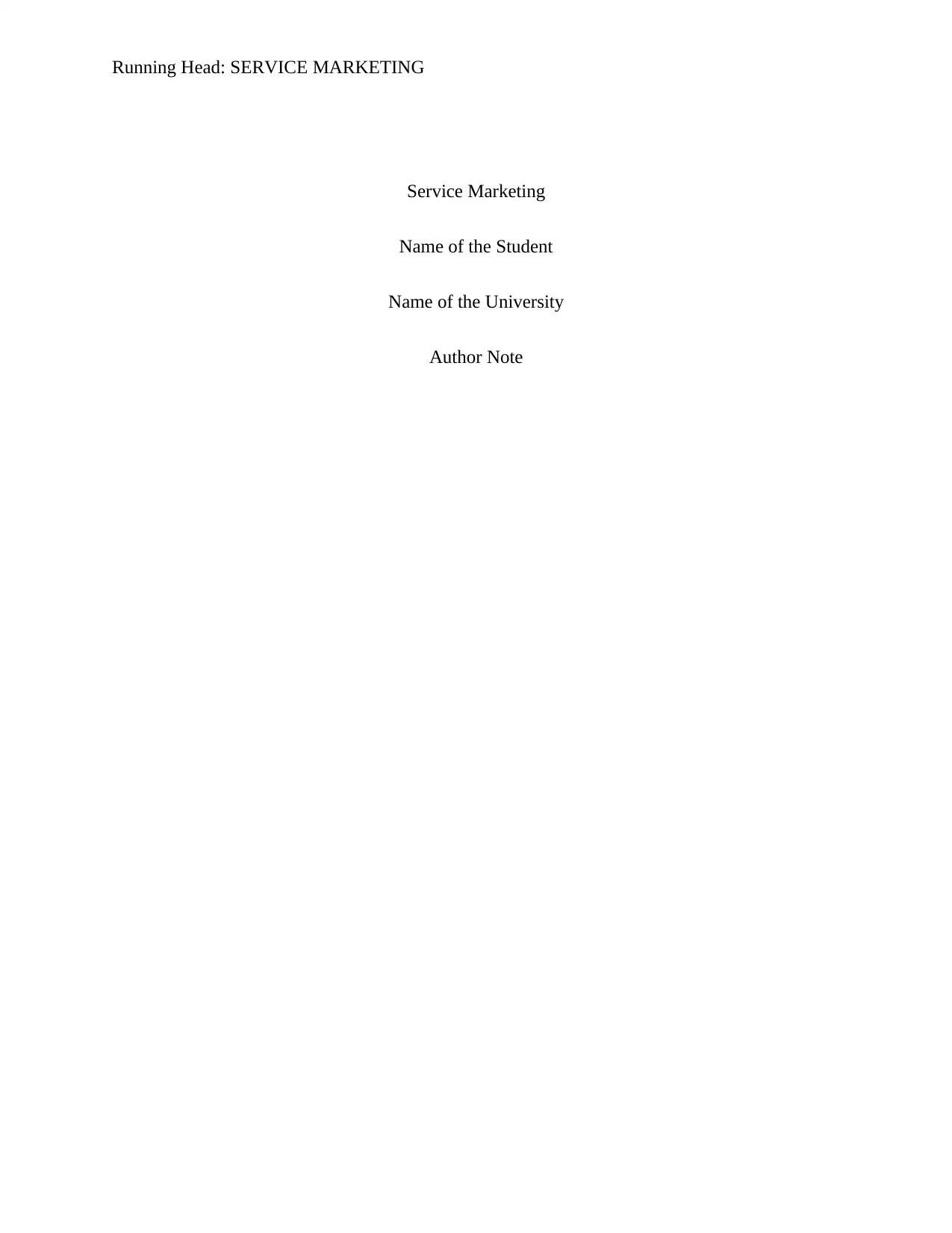
Running Head: SERVICE MARKETING
Service Marketing
Name of the Student
Name of the University
Author Note
Service Marketing
Name of the Student
Name of the University
Author Note
Paraphrase This Document
Need a fresh take? Get an instant paraphrase of this document with our AI Paraphraser
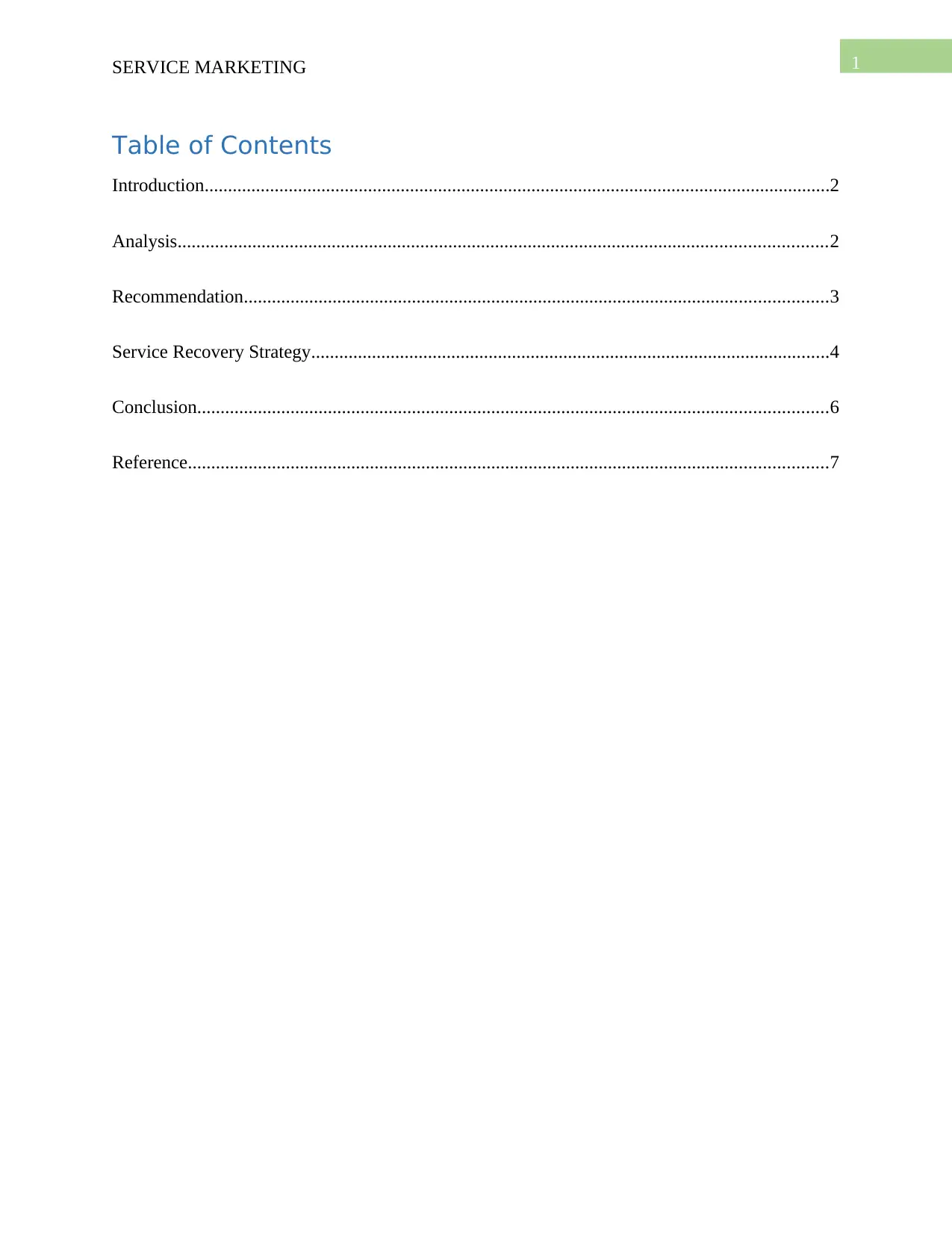
1SERVICE MARKETING
Table of Contents
Introduction......................................................................................................................................2
Analysis...........................................................................................................................................2
Recommendation.............................................................................................................................3
Service Recovery Strategy...............................................................................................................4
Conclusion.......................................................................................................................................6
Reference.........................................................................................................................................7
Table of Contents
Introduction......................................................................................................................................2
Analysis...........................................................................................................................................2
Recommendation.............................................................................................................................3
Service Recovery Strategy...............................................................................................................4
Conclusion.......................................................................................................................................6
Reference.........................................................................................................................................7
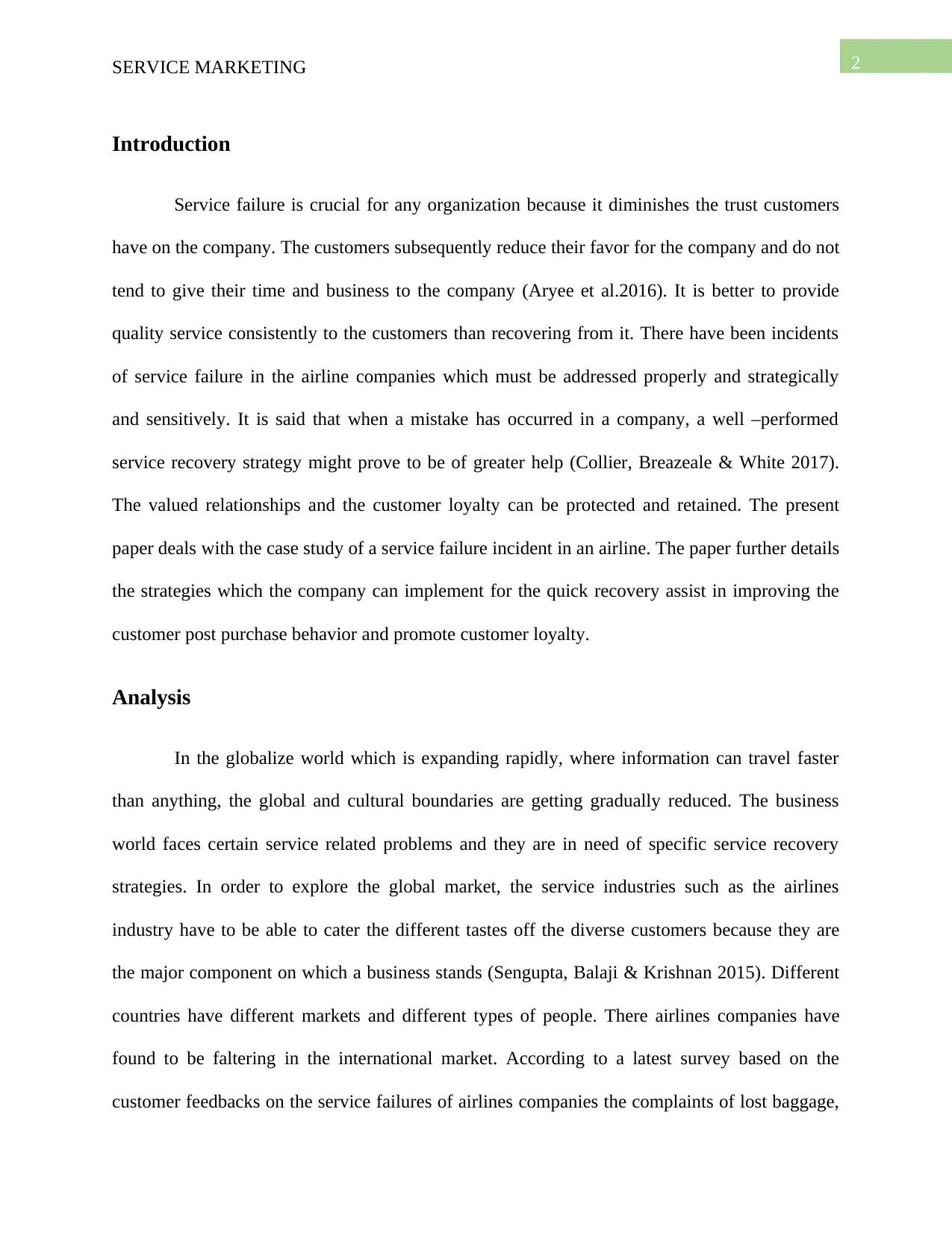
2SERVICE MARKETING
Introduction
Service failure is crucial for any organization because it diminishes the trust customers
have on the company. The customers subsequently reduce their favor for the company and do not
tend to give their time and business to the company (Aryee et al.2016). It is better to provide
quality service consistently to the customers than recovering from it. There have been incidents
of service failure in the airline companies which must be addressed properly and strategically
and sensitively. It is said that when a mistake has occurred in a company, a well –performed
service recovery strategy might prove to be of greater help (Collier, Breazeale & White 2017).
The valued relationships and the customer loyalty can be protected and retained. The present
paper deals with the case study of a service failure incident in an airline. The paper further details
the strategies which the company can implement for the quick recovery assist in improving the
customer post purchase behavior and promote customer loyalty.
Analysis
In the globalize world which is expanding rapidly, where information can travel faster
than anything, the global and cultural boundaries are getting gradually reduced. The business
world faces certain service related problems and they are in need of specific service recovery
strategies. In order to explore the global market, the service industries such as the airlines
industry have to be able to cater the different tastes off the diverse customers because they are
the major component on which a business stands (Sengupta, Balaji & Krishnan 2015). Different
countries have different markets and different types of people. There airlines companies have
found to be faltering in the international market. According to a latest survey based on the
customer feedbacks on the service failures of airlines companies the complaints of lost baggage,
Introduction
Service failure is crucial for any organization because it diminishes the trust customers
have on the company. The customers subsequently reduce their favor for the company and do not
tend to give their time and business to the company (Aryee et al.2016). It is better to provide
quality service consistently to the customers than recovering from it. There have been incidents
of service failure in the airline companies which must be addressed properly and strategically
and sensitively. It is said that when a mistake has occurred in a company, a well –performed
service recovery strategy might prove to be of greater help (Collier, Breazeale & White 2017).
The valued relationships and the customer loyalty can be protected and retained. The present
paper deals with the case study of a service failure incident in an airline. The paper further details
the strategies which the company can implement for the quick recovery assist in improving the
customer post purchase behavior and promote customer loyalty.
Analysis
In the globalize world which is expanding rapidly, where information can travel faster
than anything, the global and cultural boundaries are getting gradually reduced. The business
world faces certain service related problems and they are in need of specific service recovery
strategies. In order to explore the global market, the service industries such as the airlines
industry have to be able to cater the different tastes off the diverse customers because they are
the major component on which a business stands (Sengupta, Balaji & Krishnan 2015). Different
countries have different markets and different types of people. There airlines companies have
found to be faltering in the international market. According to a latest survey based on the
customer feedbacks on the service failures of airlines companies the complaints of lost baggage,
⊘ This is a preview!⊘
Do you want full access?
Subscribe today to unlock all pages.

Trusted by 1+ million students worldwide
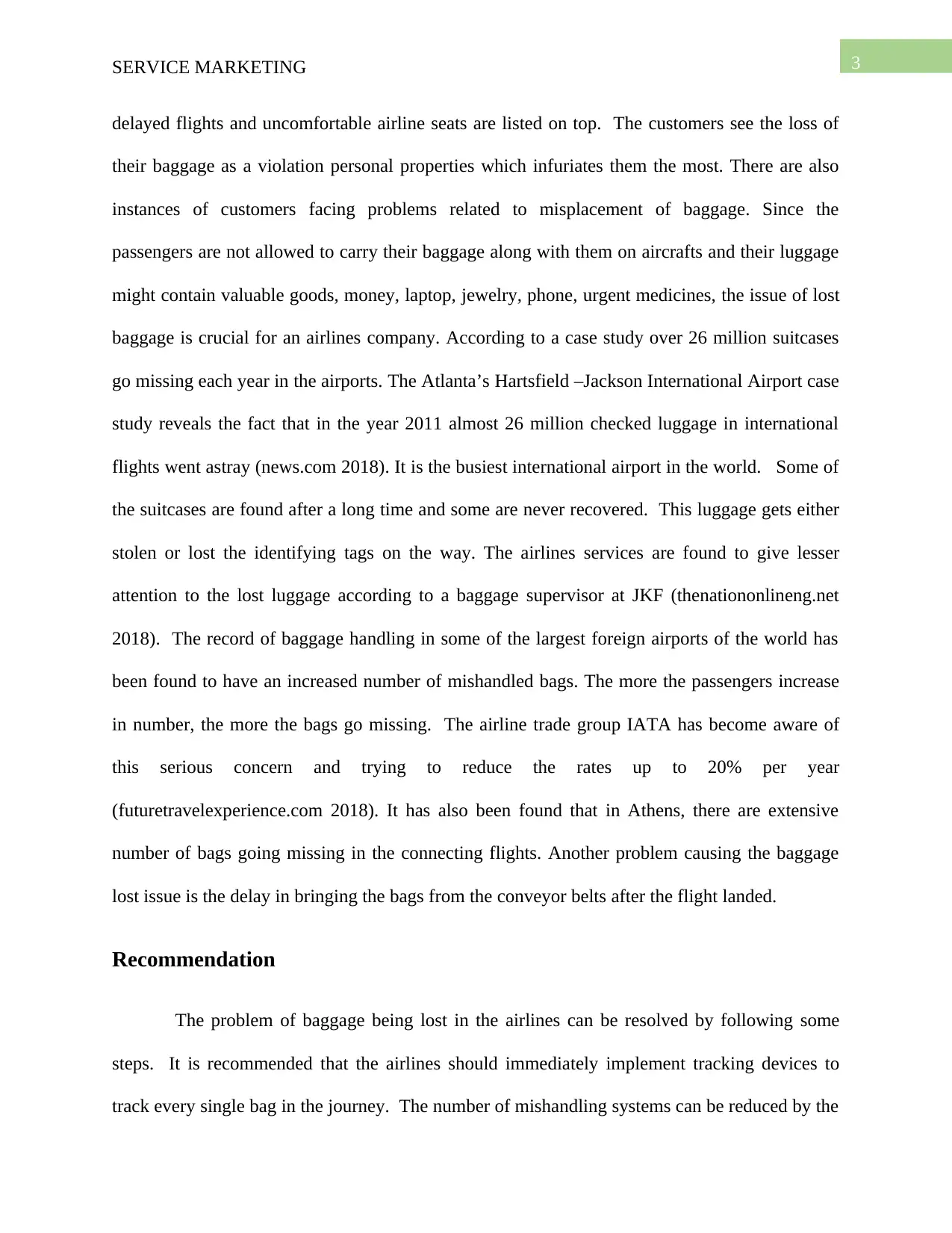
3SERVICE MARKETING
delayed flights and uncomfortable airline seats are listed on top. The customers see the loss of
their baggage as a violation personal properties which infuriates them the most. There are also
instances of customers facing problems related to misplacement of baggage. Since the
passengers are not allowed to carry their baggage along with them on aircrafts and their luggage
might contain valuable goods, money, laptop, jewelry, phone, urgent medicines, the issue of lost
baggage is crucial for an airlines company. According to a case study over 26 million suitcases
go missing each year in the airports. The Atlanta’s Hartsfield –Jackson International Airport case
study reveals the fact that in the year 2011 almost 26 million checked luggage in international
flights went astray (news.com 2018). It is the busiest international airport in the world. Some of
the suitcases are found after a long time and some are never recovered. This luggage gets either
stolen or lost the identifying tags on the way. The airlines services are found to give lesser
attention to the lost luggage according to a baggage supervisor at JKF (thenationonlineng.net
2018). The record of baggage handling in some of the largest foreign airports of the world has
been found to have an increased number of mishandled bags. The more the passengers increase
in number, the more the bags go missing. The airline trade group IATA has become aware of
this serious concern and trying to reduce the rates up to 20% per year
(futuretravelexperience.com 2018). It has also been found that in Athens, there are extensive
number of bags going missing in the connecting flights. Another problem causing the baggage
lost issue is the delay in bringing the bags from the conveyor belts after the flight landed.
Recommendation
The problem of baggage being lost in the airlines can be resolved by following some
steps. It is recommended that the airlines should immediately implement tracking devices to
track every single bag in the journey. The number of mishandling systems can be reduced by the
delayed flights and uncomfortable airline seats are listed on top. The customers see the loss of
their baggage as a violation personal properties which infuriates them the most. There are also
instances of customers facing problems related to misplacement of baggage. Since the
passengers are not allowed to carry their baggage along with them on aircrafts and their luggage
might contain valuable goods, money, laptop, jewelry, phone, urgent medicines, the issue of lost
baggage is crucial for an airlines company. According to a case study over 26 million suitcases
go missing each year in the airports. The Atlanta’s Hartsfield –Jackson International Airport case
study reveals the fact that in the year 2011 almost 26 million checked luggage in international
flights went astray (news.com 2018). It is the busiest international airport in the world. Some of
the suitcases are found after a long time and some are never recovered. This luggage gets either
stolen or lost the identifying tags on the way. The airlines services are found to give lesser
attention to the lost luggage according to a baggage supervisor at JKF (thenationonlineng.net
2018). The record of baggage handling in some of the largest foreign airports of the world has
been found to have an increased number of mishandled bags. The more the passengers increase
in number, the more the bags go missing. The airline trade group IATA has become aware of
this serious concern and trying to reduce the rates up to 20% per year
(futuretravelexperience.com 2018). It has also been found that in Athens, there are extensive
number of bags going missing in the connecting flights. Another problem causing the baggage
lost issue is the delay in bringing the bags from the conveyor belts after the flight landed.
Recommendation
The problem of baggage being lost in the airlines can be resolved by following some
steps. It is recommended that the airlines should immediately implement tracking devices to
track every single bag in the journey. The number of mishandling systems can be reduced by the
Paraphrase This Document
Need a fresh take? Get an instant paraphrase of this document with our AI Paraphraser
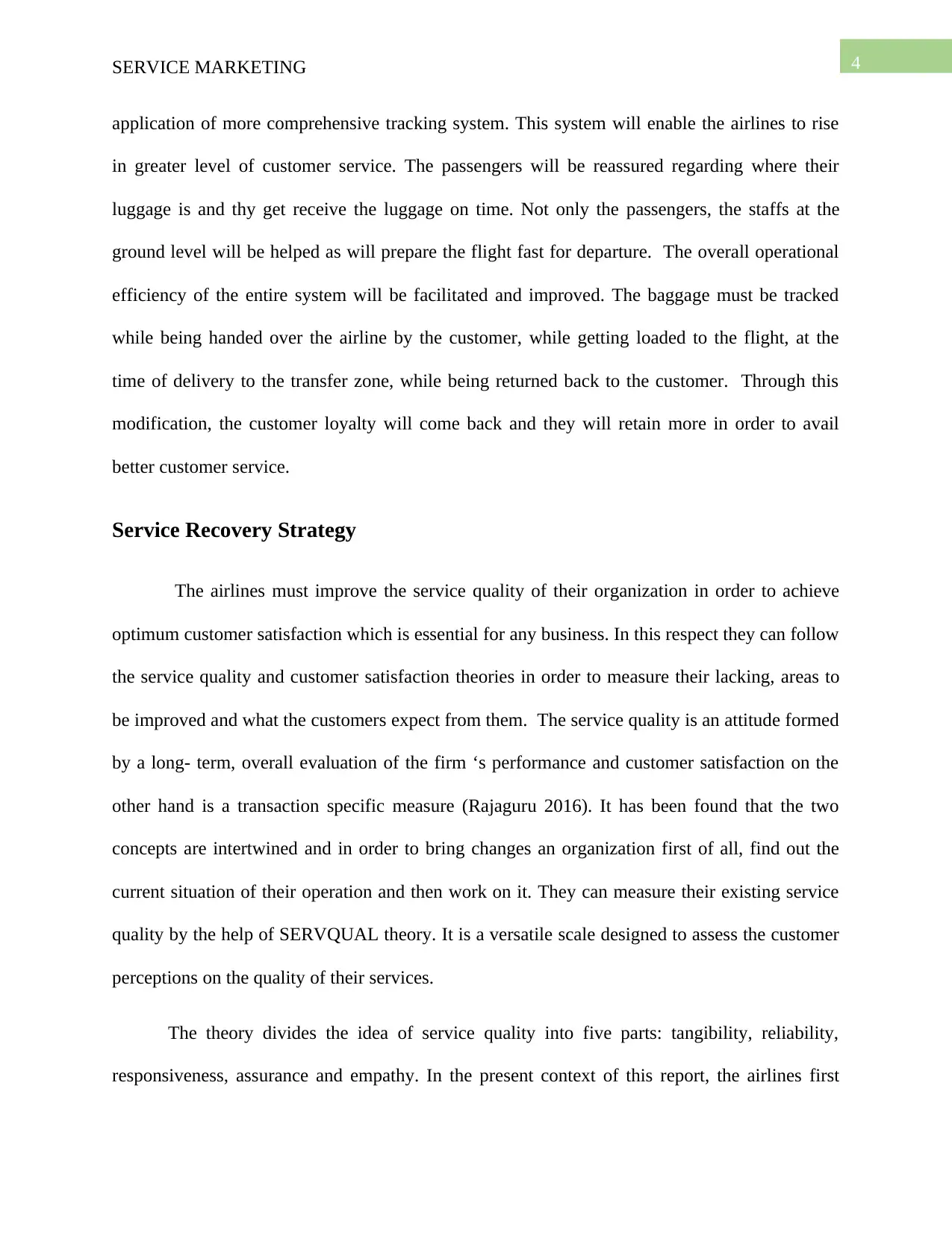
4SERVICE MARKETING
application of more comprehensive tracking system. This system will enable the airlines to rise
in greater level of customer service. The passengers will be reassured regarding where their
luggage is and thy get receive the luggage on time. Not only the passengers, the staffs at the
ground level will be helped as will prepare the flight fast for departure. The overall operational
efficiency of the entire system will be facilitated and improved. The baggage must be tracked
while being handed over the airline by the customer, while getting loaded to the flight, at the
time of delivery to the transfer zone, while being returned back to the customer. Through this
modification, the customer loyalty will come back and they will retain more in order to avail
better customer service.
Service Recovery Strategy
The airlines must improve the service quality of their organization in order to achieve
optimum customer satisfaction which is essential for any business. In this respect they can follow
the service quality and customer satisfaction theories in order to measure their lacking, areas to
be improved and what the customers expect from them. The service quality is an attitude formed
by a long- term, overall evaluation of the firm ‘s performance and customer satisfaction on the
other hand is a transaction specific measure (Rajaguru 2016). It has been found that the two
concepts are intertwined and in order to bring changes an organization first of all, find out the
current situation of their operation and then work on it. They can measure their existing service
quality by the help of SERVQUAL theory. It is a versatile scale designed to assess the customer
perceptions on the quality of their services.
The theory divides the idea of service quality into five parts: tangibility, reliability,
responsiveness, assurance and empathy. In the present context of this report, the airlines first
application of more comprehensive tracking system. This system will enable the airlines to rise
in greater level of customer service. The passengers will be reassured regarding where their
luggage is and thy get receive the luggage on time. Not only the passengers, the staffs at the
ground level will be helped as will prepare the flight fast for departure. The overall operational
efficiency of the entire system will be facilitated and improved. The baggage must be tracked
while being handed over the airline by the customer, while getting loaded to the flight, at the
time of delivery to the transfer zone, while being returned back to the customer. Through this
modification, the customer loyalty will come back and they will retain more in order to avail
better customer service.
Service Recovery Strategy
The airlines must improve the service quality of their organization in order to achieve
optimum customer satisfaction which is essential for any business. In this respect they can follow
the service quality and customer satisfaction theories in order to measure their lacking, areas to
be improved and what the customers expect from them. The service quality is an attitude formed
by a long- term, overall evaluation of the firm ‘s performance and customer satisfaction on the
other hand is a transaction specific measure (Rajaguru 2016). It has been found that the two
concepts are intertwined and in order to bring changes an organization first of all, find out the
current situation of their operation and then work on it. They can measure their existing service
quality by the help of SERVQUAL theory. It is a versatile scale designed to assess the customer
perceptions on the quality of their services.
The theory divides the idea of service quality into five parts: tangibility, reliability,
responsiveness, assurance and empathy. In the present context of this report, the airlines first
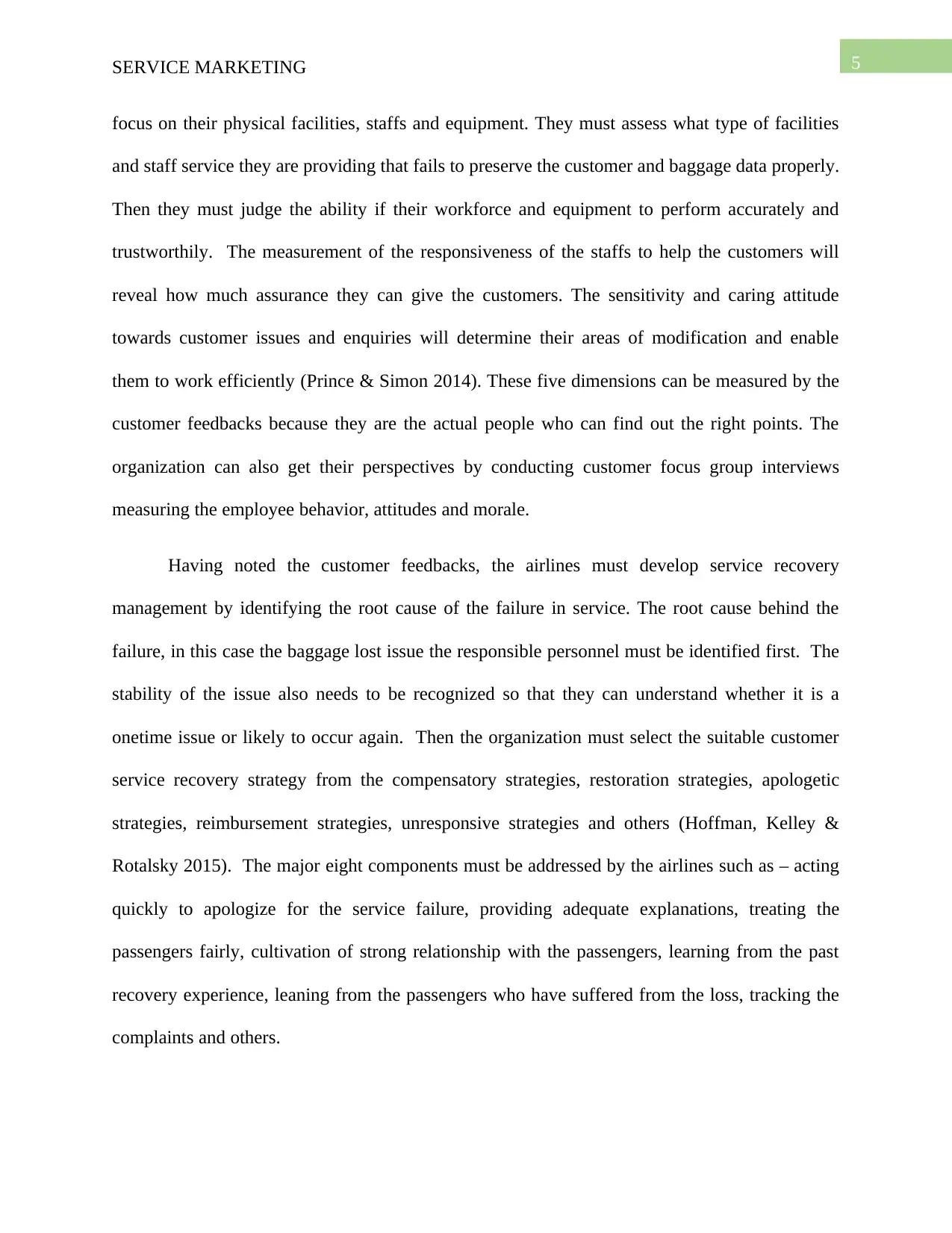
5SERVICE MARKETING
focus on their physical facilities, staffs and equipment. They must assess what type of facilities
and staff service they are providing that fails to preserve the customer and baggage data properly.
Then they must judge the ability if their workforce and equipment to perform accurately and
trustworthily. The measurement of the responsiveness of the staffs to help the customers will
reveal how much assurance they can give the customers. The sensitivity and caring attitude
towards customer issues and enquiries will determine their areas of modification and enable
them to work efficiently (Prince & Simon 2014). These five dimensions can be measured by the
customer feedbacks because they are the actual people who can find out the right points. The
organization can also get their perspectives by conducting customer focus group interviews
measuring the employee behavior, attitudes and morale.
Having noted the customer feedbacks, the airlines must develop service recovery
management by identifying the root cause of the failure in service. The root cause behind the
failure, in this case the baggage lost issue the responsible personnel must be identified first. The
stability of the issue also needs to be recognized so that they can understand whether it is a
onetime issue or likely to occur again. Then the organization must select the suitable customer
service recovery strategy from the compensatory strategies, restoration strategies, apologetic
strategies, reimbursement strategies, unresponsive strategies and others (Hoffman, Kelley &
Rotalsky 2015). The major eight components must be addressed by the airlines such as – acting
quickly to apologize for the service failure, providing adequate explanations, treating the
passengers fairly, cultivation of strong relationship with the passengers, learning from the past
recovery experience, leaning from the passengers who have suffered from the loss, tracking the
complaints and others.
focus on their physical facilities, staffs and equipment. They must assess what type of facilities
and staff service they are providing that fails to preserve the customer and baggage data properly.
Then they must judge the ability if their workforce and equipment to perform accurately and
trustworthily. The measurement of the responsiveness of the staffs to help the customers will
reveal how much assurance they can give the customers. The sensitivity and caring attitude
towards customer issues and enquiries will determine their areas of modification and enable
them to work efficiently (Prince & Simon 2014). These five dimensions can be measured by the
customer feedbacks because they are the actual people who can find out the right points. The
organization can also get their perspectives by conducting customer focus group interviews
measuring the employee behavior, attitudes and morale.
Having noted the customer feedbacks, the airlines must develop service recovery
management by identifying the root cause of the failure in service. The root cause behind the
failure, in this case the baggage lost issue the responsible personnel must be identified first. The
stability of the issue also needs to be recognized so that they can understand whether it is a
onetime issue or likely to occur again. Then the organization must select the suitable customer
service recovery strategy from the compensatory strategies, restoration strategies, apologetic
strategies, reimbursement strategies, unresponsive strategies and others (Hoffman, Kelley &
Rotalsky 2015). The major eight components must be addressed by the airlines such as – acting
quickly to apologize for the service failure, providing adequate explanations, treating the
passengers fairly, cultivation of strong relationship with the passengers, learning from the past
recovery experience, leaning from the passengers who have suffered from the loss, tracking the
complaints and others.
⊘ This is a preview!⊘
Do you want full access?
Subscribe today to unlock all pages.

Trusted by 1+ million students worldwide
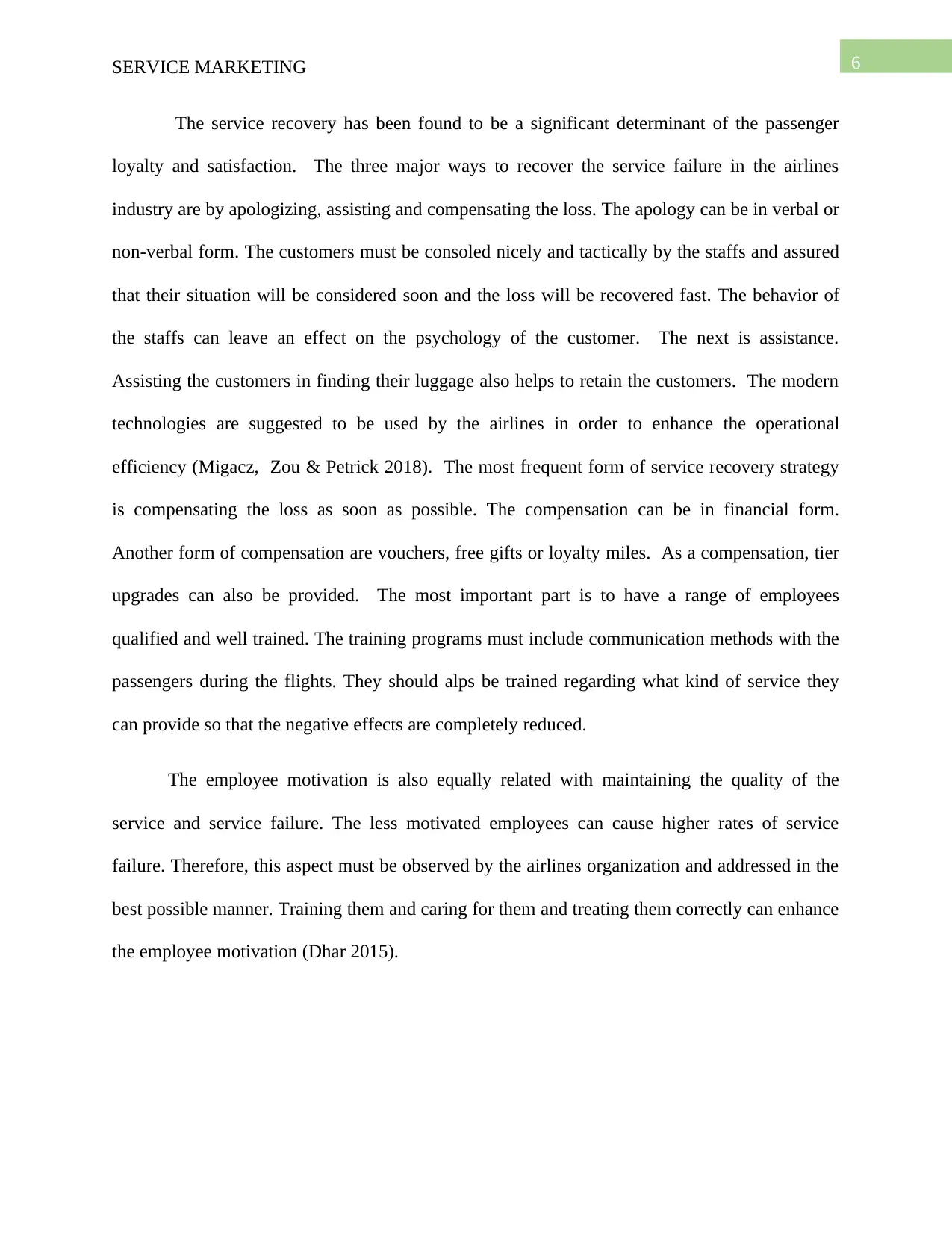
6SERVICE MARKETING
The service recovery has been found to be a significant determinant of the passenger
loyalty and satisfaction. The three major ways to recover the service failure in the airlines
industry are by apologizing, assisting and compensating the loss. The apology can be in verbal or
non-verbal form. The customers must be consoled nicely and tactically by the staffs and assured
that their situation will be considered soon and the loss will be recovered fast. The behavior of
the staffs can leave an effect on the psychology of the customer. The next is assistance.
Assisting the customers in finding their luggage also helps to retain the customers. The modern
technologies are suggested to be used by the airlines in order to enhance the operational
efficiency (Migacz, Zou & Petrick 2018). The most frequent form of service recovery strategy
is compensating the loss as soon as possible. The compensation can be in financial form.
Another form of compensation are vouchers, free gifts or loyalty miles. As a compensation, tier
upgrades can also be provided. The most important part is to have a range of employees
qualified and well trained. The training programs must include communication methods with the
passengers during the flights. They should alps be trained regarding what kind of service they
can provide so that the negative effects are completely reduced.
The employee motivation is also equally related with maintaining the quality of the
service and service failure. The less motivated employees can cause higher rates of service
failure. Therefore, this aspect must be observed by the airlines organization and addressed in the
best possible manner. Training them and caring for them and treating them correctly can enhance
the employee motivation (Dhar 2015).
The service recovery has been found to be a significant determinant of the passenger
loyalty and satisfaction. The three major ways to recover the service failure in the airlines
industry are by apologizing, assisting and compensating the loss. The apology can be in verbal or
non-verbal form. The customers must be consoled nicely and tactically by the staffs and assured
that their situation will be considered soon and the loss will be recovered fast. The behavior of
the staffs can leave an effect on the psychology of the customer. The next is assistance.
Assisting the customers in finding their luggage also helps to retain the customers. The modern
technologies are suggested to be used by the airlines in order to enhance the operational
efficiency (Migacz, Zou & Petrick 2018). The most frequent form of service recovery strategy
is compensating the loss as soon as possible. The compensation can be in financial form.
Another form of compensation are vouchers, free gifts or loyalty miles. As a compensation, tier
upgrades can also be provided. The most important part is to have a range of employees
qualified and well trained. The training programs must include communication methods with the
passengers during the flights. They should alps be trained regarding what kind of service they
can provide so that the negative effects are completely reduced.
The employee motivation is also equally related with maintaining the quality of the
service and service failure. The less motivated employees can cause higher rates of service
failure. Therefore, this aspect must be observed by the airlines organization and addressed in the
best possible manner. Training them and caring for them and treating them correctly can enhance
the employee motivation (Dhar 2015).
Paraphrase This Document
Need a fresh take? Get an instant paraphrase of this document with our AI Paraphraser
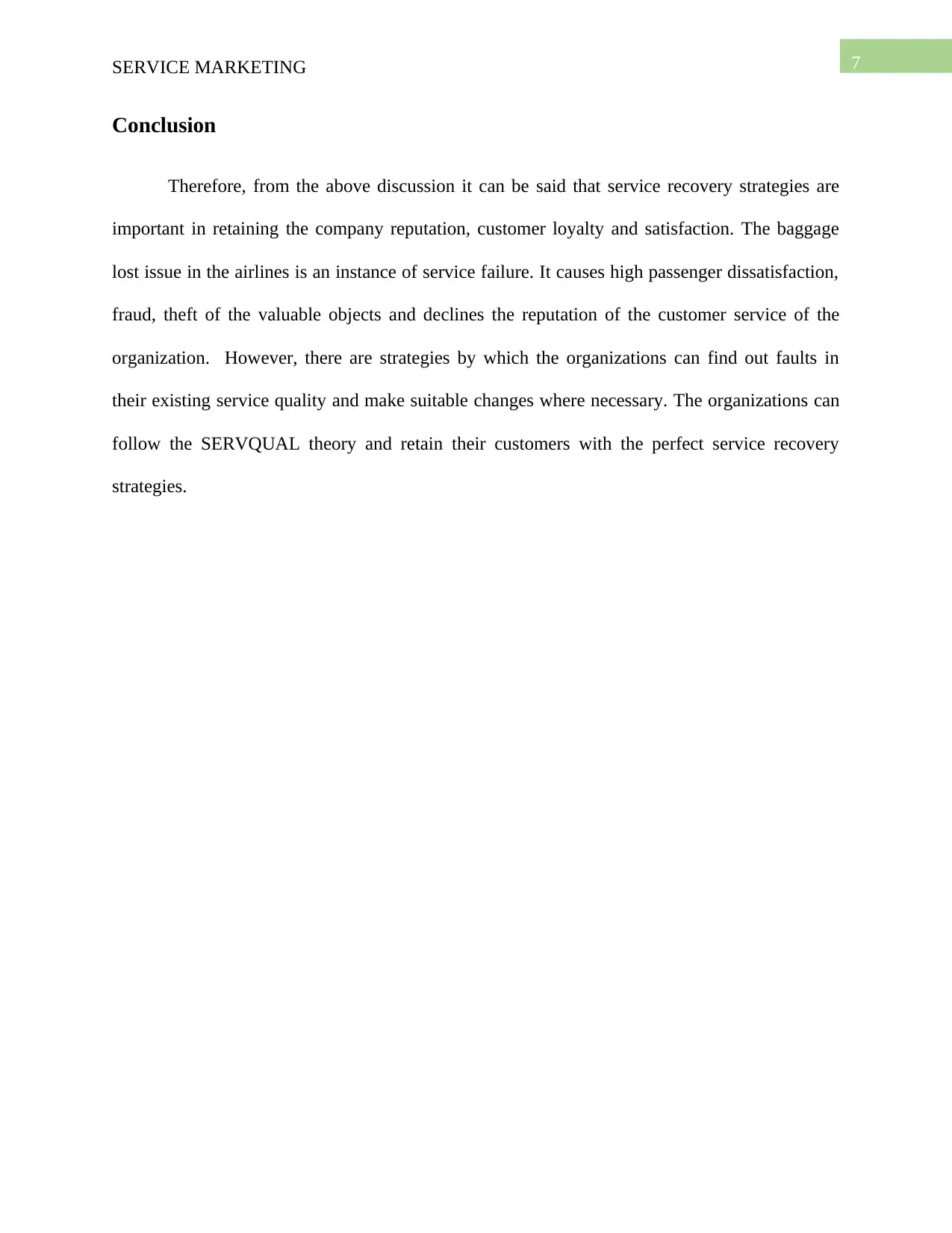
7SERVICE MARKETING
Conclusion
Therefore, from the above discussion it can be said that service recovery strategies are
important in retaining the company reputation, customer loyalty and satisfaction. The baggage
lost issue in the airlines is an instance of service failure. It causes high passenger dissatisfaction,
fraud, theft of the valuable objects and declines the reputation of the customer service of the
organization. However, there are strategies by which the organizations can find out faults in
their existing service quality and make suitable changes where necessary. The organizations can
follow the SERVQUAL theory and retain their customers with the perfect service recovery
strategies.
Conclusion
Therefore, from the above discussion it can be said that service recovery strategies are
important in retaining the company reputation, customer loyalty and satisfaction. The baggage
lost issue in the airlines is an instance of service failure. It causes high passenger dissatisfaction,
fraud, theft of the valuable objects and declines the reputation of the customer service of the
organization. However, there are strategies by which the organizations can find out faults in
their existing service quality and make suitable changes where necessary. The organizations can
follow the SERVQUAL theory and retain their customers with the perfect service recovery
strategies.
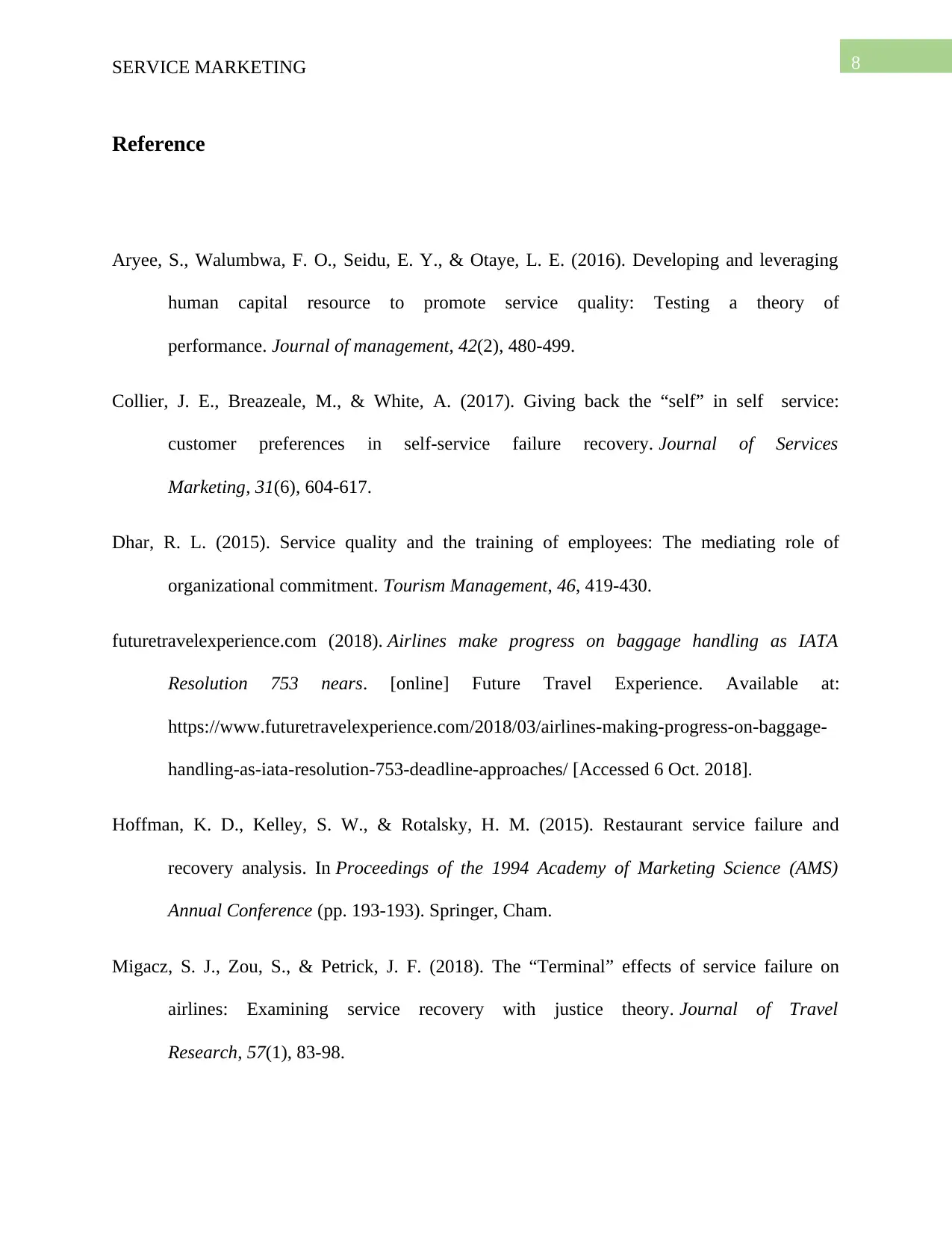
8SERVICE MARKETING
Reference
Aryee, S., Walumbwa, F. O., Seidu, E. Y., & Otaye, L. E. (2016). Developing and leveraging
human capital resource to promote service quality: Testing a theory of
performance. Journal of management, 42(2), 480-499.
Collier, J. E., Breazeale, M., & White, A. (2017). Giving back the “self” in self service:
customer preferences in self-service failure recovery. Journal of Services
Marketing, 31(6), 604-617.
Dhar, R. L. (2015). Service quality and the training of employees: The mediating role of
organizational commitment. Tourism Management, 46, 419-430.
futuretravelexperience.com (2018). Airlines make progress on baggage handling as IATA
Resolution 753 nears. [online] Future Travel Experience. Available at:
https://www.futuretravelexperience.com/2018/03/airlines-making-progress-on-baggage-
handling-as-iata-resolution-753-deadline-approaches/ [Accessed 6 Oct. 2018].
Hoffman, K. D., Kelley, S. W., & Rotalsky, H. M. (2015). Restaurant service failure and
recovery analysis. In Proceedings of the 1994 Academy of Marketing Science (AMS)
Annual Conference (pp. 193-193). Springer, Cham.
Migacz, S. J., Zou, S., & Petrick, J. F. (2018). The “Terminal” effects of service failure on
airlines: Examining service recovery with justice theory. Journal of Travel
Research, 57(1), 83-98.
Reference
Aryee, S., Walumbwa, F. O., Seidu, E. Y., & Otaye, L. E. (2016). Developing and leveraging
human capital resource to promote service quality: Testing a theory of
performance. Journal of management, 42(2), 480-499.
Collier, J. E., Breazeale, M., & White, A. (2017). Giving back the “self” in self service:
customer preferences in self-service failure recovery. Journal of Services
Marketing, 31(6), 604-617.
Dhar, R. L. (2015). Service quality and the training of employees: The mediating role of
organizational commitment. Tourism Management, 46, 419-430.
futuretravelexperience.com (2018). Airlines make progress on baggage handling as IATA
Resolution 753 nears. [online] Future Travel Experience. Available at:
https://www.futuretravelexperience.com/2018/03/airlines-making-progress-on-baggage-
handling-as-iata-resolution-753-deadline-approaches/ [Accessed 6 Oct. 2018].
Hoffman, K. D., Kelley, S. W., & Rotalsky, H. M. (2015). Restaurant service failure and
recovery analysis. In Proceedings of the 1994 Academy of Marketing Science (AMS)
Annual Conference (pp. 193-193). Springer, Cham.
Migacz, S. J., Zou, S., & Petrick, J. F. (2018). The “Terminal” effects of service failure on
airlines: Examining service recovery with justice theory. Journal of Travel
Research, 57(1), 83-98.
⊘ This is a preview!⊘
Do you want full access?
Subscribe today to unlock all pages.

Trusted by 1+ million students worldwide
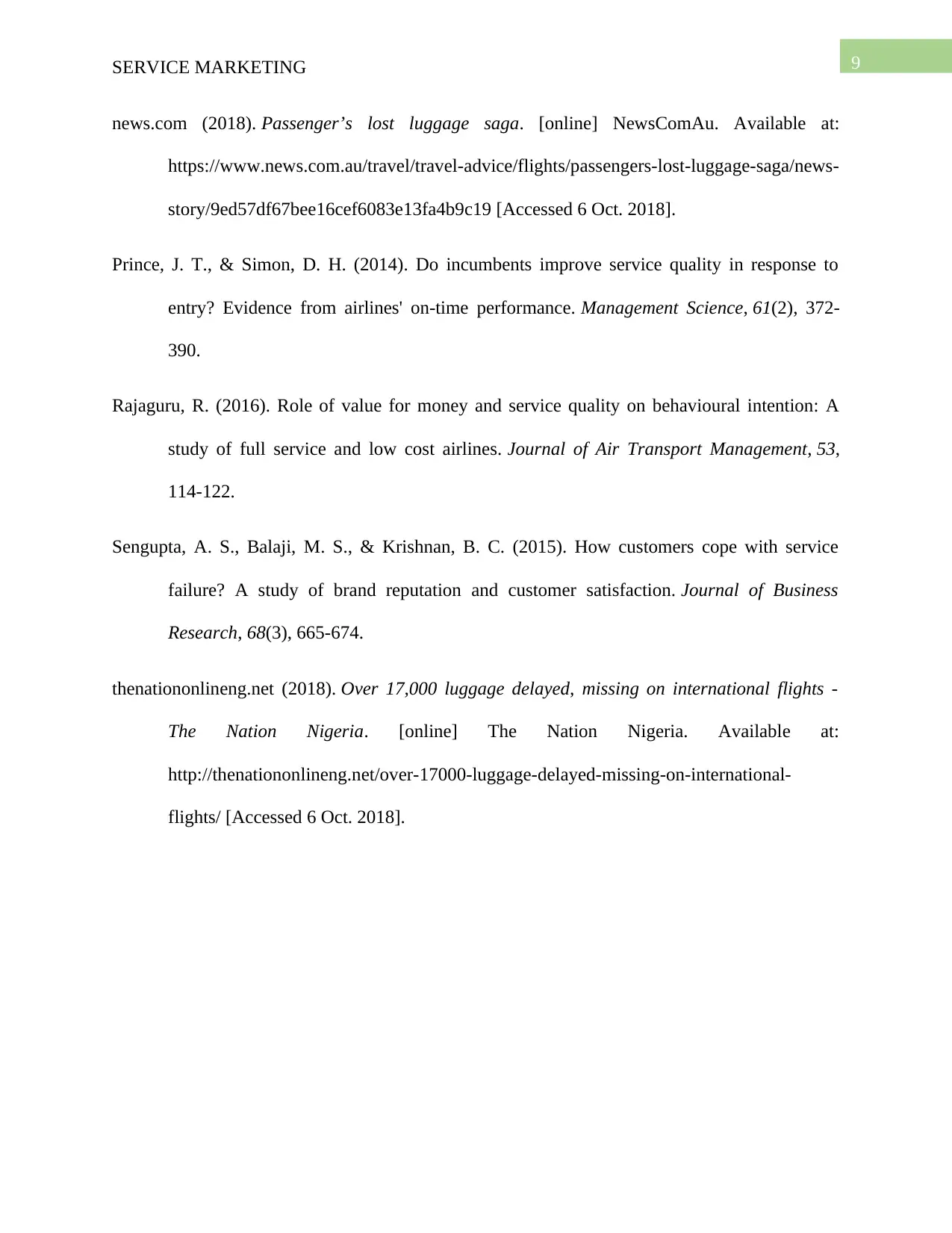
9SERVICE MARKETING
news.com (2018). Passenger’s lost luggage saga. [online] NewsComAu. Available at:
https://www.news.com.au/travel/travel-advice/flights/passengers-lost-luggage-saga/news-
story/9ed57df67bee16cef6083e13fa4b9c19 [Accessed 6 Oct. 2018].
Prince, J. T., & Simon, D. H. (2014). Do incumbents improve service quality in response to
entry? Evidence from airlines' on-time performance. Management Science, 61(2), 372-
390.
Rajaguru, R. (2016). Role of value for money and service quality on behavioural intention: A
study of full service and low cost airlines. Journal of Air Transport Management, 53,
114-122.
Sengupta, A. S., Balaji, M. S., & Krishnan, B. C. (2015). How customers cope with service
failure? A study of brand reputation and customer satisfaction. Journal of Business
Research, 68(3), 665-674.
thenationonlineng.net (2018). Over 17,000 luggage delayed, missing on international flights -
The Nation Nigeria. [online] The Nation Nigeria. Available at:
http://thenationonlineng.net/over-17000-luggage-delayed-missing-on-international-
flights/ [Accessed 6 Oct. 2018].
news.com (2018). Passenger’s lost luggage saga. [online] NewsComAu. Available at:
https://www.news.com.au/travel/travel-advice/flights/passengers-lost-luggage-saga/news-
story/9ed57df67bee16cef6083e13fa4b9c19 [Accessed 6 Oct. 2018].
Prince, J. T., & Simon, D. H. (2014). Do incumbents improve service quality in response to
entry? Evidence from airlines' on-time performance. Management Science, 61(2), 372-
390.
Rajaguru, R. (2016). Role of value for money and service quality on behavioural intention: A
study of full service and low cost airlines. Journal of Air Transport Management, 53,
114-122.
Sengupta, A. S., Balaji, M. S., & Krishnan, B. C. (2015). How customers cope with service
failure? A study of brand reputation and customer satisfaction. Journal of Business
Research, 68(3), 665-674.
thenationonlineng.net (2018). Over 17,000 luggage delayed, missing on international flights -
The Nation Nigeria. [online] The Nation Nigeria. Available at:
http://thenationonlineng.net/over-17000-luggage-delayed-missing-on-international-
flights/ [Accessed 6 Oct. 2018].
1 out of 10
Related Documents
Your All-in-One AI-Powered Toolkit for Academic Success.
+13062052269
info@desklib.com
Available 24*7 on WhatsApp / Email
![[object Object]](/_next/static/media/star-bottom.7253800d.svg)
Unlock your academic potential
Copyright © 2020–2026 A2Z Services. All Rights Reserved. Developed and managed by ZUCOL.





